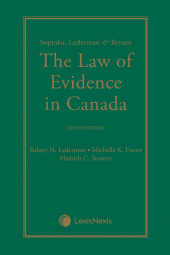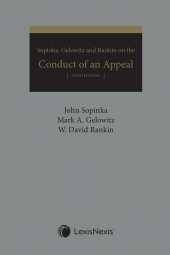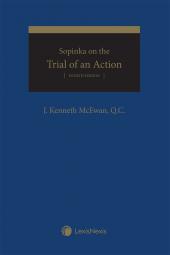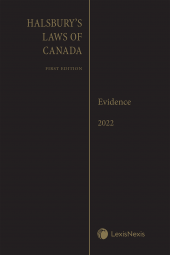Sopinka, Lederman & Bryant – The Law of Evidence, 6th Edition
One Year Subscription Only Terms
Subscribers receive the product(s) listed on the Order Form and any Updates made available during the annual subscription period. Shipping and handling fees are not included in the annual price.
Subscribers are advised of the number of Updates that were made to the particular publication the prior year. The number of Updates may vary due to developments in the law and other publishing issues, but subscribers may use this as a rough estimate of future shipments. Subscribers may call Customer Support at 800-833-9844 for additional information.
Subscribers may cancel this subscription by: calling Customer Support at 800-833-9844; emailing customer.support@lexisnexis.com; or returning the invoice marked 'CANCEL'.
If subscribers cancel within 30 days after the product is ordered or received and return the product at their expense, then they will receive a full credit of the price for the annual subscription.
If subscribers cancel between 31 and 60 days after the invoice date and return the product at their expense, then they will receive a 5/6th credit of the price for the annual subscription. No credit will be given for cancellations more than 60 days after the invoice date. To receive any credit, subscriber must return all product(s) shipped during the year at their expense within the applicable cancellation period listed above.
Product description
If your practice involves representing clients in civil or criminal litigation proceedings, Sopinka, Lederman & Bryant – The Law of Evidence, 6th Edition must figure prominently on your bookshelf. This new edition of the seminal work offers current and in-depth coverage of the Canadian law of evidence, and has been updated to include significant recent developments.
Learn From the Experts
This go-to resource is written by former and current Superior Court Justices, as well as a Professor of Law at the University of Toronto, Faculty of Law. Together, the authors bring decades of experience and the necessary expertise to guide practitioners, scholars and students through this complex and ever-changing area of the law.
- Understand and deal with issues such as illegally obtained evidence, confessions and corroboration
- Identify when witnesses will be competent and compellable to testify
- Conduct examinations and cross-examinations within the appropriate scope
- Gauge whether the burden and standard of proof have been met
- Recognize the existence and extent of privilege
- Understand the Supreme Court of Canada's continuing development and extension of the "Principled Approach" into virtually every facet of the law of evidence
- Gain insight into the admissibility of evidence in many different areas, including character evidence, hearsay evidence, similar fact evidence, opinion evidence and documentary evidence
In addition to substantive guidance, Sopinka, Lederman & Bryant – The Law of Evidence, 6th Edition is organized to maximize ease-of-use, with a detailed table of contents and numbered paragraphs for quick access and precise cross-referencing.
What's New In This Edition
This text has been updated to take into account new case law and practice developments that have occurred since the previous edition was published in 2018, including:
Discussion of Statutory Provisions –
- Inconsistent appellate decisions regarding whether s. 33.1 of the Criminal Code, which provides that self-induced intoxication is not a defence to any general intent offence involving interference with bodily integrity, violates s. 11(d) of the Charter
- The presumption under s. 172.1(3) and (4) that an accused believes that a person they are communicating with is a specific age solely because that person indicates that this is the case infringes the s. 11(d) Charter right to be presumed innocent
- Repeal of impaired driving provisions ss. 249-261 of the Criminal Code, and enactment of offences involving conveyances under the new Part VIII.1, which address evidentiary matters and provide evidence-related legal procedures and presumptions
- Ss. 278.92 to 278.97 of the Criminal Code, which specify a two-stage procedure to determine admissibility of personal records in the possession of an accused charged with sexual assault
- The presumption of integrity for an electronic documents system under s. 31.3(1)(a) of the Canada Evidence Act applied to data extracted from the cell phone of the accused’s son (R. v. H. (S.), 2019 ONCA 669)
- The first Supreme Court of Canada decision (Denis v. Côté, 2019 SCC 44) analyzing s. 39.1 of the Canada Evidence Act, which permits objection by a journalist or other person to disclosure of information identifying a journalistic source
Supreme Court of Canada Decisions –
- R. v. Calnen, 2019 SCC 6 (when trial judge not required to provide a limiting instruction against general propensity reasoning with respect to the accused’s post-offence conduct)
- R. v. Le, 2019 SCC 34 (Court clarifies interaction of the three Grant factors applicable to exclusion of evidence under s. 24(2) of the Charter)
- R. v. Goldfinch, 2019 SCC 38; R. v. Barton, 2019 SCC 33; R. v. V. (R.), 2019 SCC 41 (cases regarding admissibility of previous sexual history of complainants)
- R. v. Slatter, 2020 SCC 36 (expert evidence as to credibility and reliability of a witness with a cognitive or psychological disability may perpetuate harmful myths and stereotypes)
- R. v. Le, 2019 SCC 34 (high threshold for judicial notice, particularly if it is dispositive of an issue)
Other Important Issues –
- Counsel must clearly articulate the precise purpose for which a hearsay statement is being adduced – even if counsel is consenting to admission of the evidence: R. v. L. (O.J.), 2020 ABCA 73; R. v. Durocher, 2019 SKCA 97; R. v. Short, 2018 ONCA 1
- Circumstances where text messages sent by a complainant are admissible to support their in-court testimony: R. v. Langan, 2019 BCCA 467
- Growing judicial support for a principled approach to admissibility of prior consistent statements: R. v. Gill, 2018 BCCA 275
- The “strikingly similar” standard for similar fact evidence is no longer applicable: R. v. Norris, 2020 ONCA 847
- Text messages between spouses discussing how to “get rid of” the murder victim were not protected under spousal privilege: R. v. Cuthill, 2018 ABCA 321
- Three-part test in Ontario with respect to withdrawal of admissions of fact: Liu v. Personal Insurance Co., 2019 ONCA 104; Champoux v. Jefremova, 2021 ONCA 92
- When accused permitted to appeal from interlocutory Charter ruling after pleading guilty: R. v. Del Torro, 2019 ABCA 156
- Determination of which charge is the more serious one for the purposes of staying a charge or conviction under the Kienapple rule: R. v. L. (M.), 2021 NBCA 27
Who Should Read This Book
- Civil litigators, criminal practitioners (Crown & Defence) and family law practitioners seeking guidance on issues involving different types of evidence, witnesses and testimony
- Law school professors and law students interested in referencing the definitive authority to better understand the law of evidence in Canada
- Law libraries dedicated to having the most up-to-date resources and reference materials available to their patrons
- Members of the judiciary who need access to the latest appellate case law and expert commentary on the admissibility of evidence across a wide range of categories
Table of contents
PREFACE
ABOUT THE AUTHORS
TABLE OF CASES
TABLE OF LEGISLATION
CHAPTER 1: FOUNDATIONAL PRINCIPLES OF EVIDENCE AND THE IMPORTANCE OF EVIDENTIARY RULINGS IN CONTEXT
CHAPTER 2: TYPES OF EVIDENCE AND CONDITIONS FOR THE RECEIPT OF EVIDENCE
CHAPTER 3: EVIDENTIAL BURDEN AND BURDEN OF PROOF
CHAPTER 4: PRESUMPTIONS
CHAPTER 5: STANDARDS OF PROOF
CHAPTER 6: HEARSAY
CHAPTER 7: SELF-SERVING EVIDENCE
CHAPTER 8: CONFESSIONS
CHAPTER 9: ILLEGALLY OBTAINED EVIDENCE
CHAPTER 10: CHARACTER EVIDENCE
CHAPTER 11: SIMILAR FACT EVIDENCE
CHAPTER 12: OPINION EVIDENCE
CHAPTER 13: COMPETENCE AND COMPELLABILITY OF WITNESSES
CHAPTER 14: PRIVILEGE
CHAPTER 15: PUBLIC INTEREST IMMUNITY
CHAPTER 16: THE EXAMINATION OF WITNESSES
CHAPTER 17: CORROBORATION
CHAPTER 18: DOCUMENTARY EVIDENCE
CHAPTER 19: RULES DISPENSING WITH OR FACILITATING PROOF
 Lexis Nexis
Lexis Nexis 


